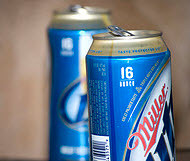Banks Changing Your Locks, Drinking Your Beer

(ash™)
There is a really fun legal gray area when it comes to foreclosed properties. Laws about how to handle the process are different around the country, and reports are popping up about banks cutting the locks off the doors of homes where people are still in residence, gerbils being confiscated — and let’s not forget the hapless Canadian tourists whose delicious beverages went missing after the locks were changed on their vacation rental.
From the Herald Tribune (emphasis ours):
Two Canadian tourists returning to their rental home from a day at the beach found evidence burglars had struck — or so it seemed.
Their laptop computer and MP3 player were missing, as were six bottles of wine. A half-empty beer opened by the intruders was still cold and sitting on the kitchen counter.
But why, then, had the locks on the front door been changed?
It turns out that a Sarasota company working for a lender trying to retake the property through foreclosure sent two men to the Punta Gorda home to break in and change the locks, even though the home was obviously occupied.
It is illegal for any bank representative to enter a property if they have not yet retaken it at a foreclosure sale, especially if there is any sign the home is occupied, foreclosure experts say.
The process of banks hiring people to break into homes, even when occupied, is just the latest oddity of the messy foreclosure crisis in Florida.
The Herald Tribune says these incidents aren’t treated like break-ins by police because there’s no criminal intent by the banks.
And here’s another story from Florida where a woman locked herself in the bathroom and called 911 because she thought the person sawing the locks off of her front door was actually some sort of scary killer or something:
Well, at least we live in interesting times.
Banks Breaking Into Occupied Homes In Foreclosure To Change Locks [Huff Po] (Thanks, Lee!)
Bank changes locks on occupied, foreclosed homes [Herald Tribune]
Want more consumer news? Visit our parent organization, Consumer Reports, for the latest on scams, recalls, and other consumer issues.

